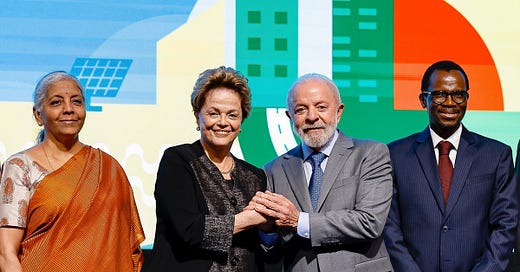BRICS Summit Without Xi and Putin
The two prominent members of BRIC, China and Russia, did not find it possible to send their autocratic rulers to Brazil for the annual BRICS Summit.
The yearly BRICS Summit opened in Rio de Janeiro yesterday, with some notable absences. Chinese President Xi Jinping and Russian President Vladimir Putin are not attending physically, but were expected to make statements over video link. It does raise some questions over the bloc’s cohesion in these times of major global strategic and economical upheaval.
The two-day summit will discuss, with some caution, pressing topics such as the US tariffs war on most of BRICS except Russia and the US-Israeli attack on Iran’s nuclear facilities, as well as the humanitarian catastrophe in Gaza.
Compared to last year’s summit in Russia, the mood is completely different and much less festive. Last year, BRICS welcomed more countries in an enlargement push that doubled the number of members. This, in turn, has now come back as a complication because the new members are not fully integrated as yet and the appetite for standing strong as a cohesive alternative center of global affairs is lower than last year. Many moderate member countries prefer to stay out of Trump’s sight as much as possible. Last year’s meeting was a high for Putin, especially, this year, not so much.
Putin decided to not turn up in Brazil because the host Lula da Silva could not issue a guarantee that authorities will ignore the arrest warrant still hanging over Putin’s head like the sword of Damocles. He realizes it is high risk for his life to travel to any country that is signatory to the Rome Statute.
On the other hand, it is less clear why Xi is not coming to the BRICS summit. The official reason is given as ‘scheduling conflicts’. The calendar of the Chinese ruler is not known to show any major international meetings before the EU-China Summit in Beijing later this month.
Prime Minister Li Qiang is representing Beijing and Foreign Minister Sergey Lavrov is replacing Putin, who delivered an address via video link to the assembly.
Agenda of the Summit
Brazil's President Lula da Silva has found room on the agenda for a number of his priorities, such artificial intelligence and climate change, alongside the main issues of economy and development.
President Lula and NDB President Dilma Rousseff on the eve of the BRICS Summit – Photo: Ricardo Stuckert BRICS Summit
Celebrating the tenth anniversary of the New Development Bank (NDB), a BRICS creation, ahead of the Summit, Lula and the bank’s leader, former Brazilian president Dilma Rousseff stated: ‘We are only at the beginning. During its first decade, the New Development Bank (NDB) laid the groundwork for its institutional development. In coming decade, it is essential that we consolidate our leadership role in fostering equitable, sustainable, and autonomous development within a multipolar world. This entails developing an institution that is not only financially robust, but also politically relevant and transformative’.
Lula said in his speech to the assembly on Sunday that ‘we are witnessing the unparalleled collapse of multilateralism’ and that the meeting is taking place ‘in the most adverse global scenario’ of the four times Brazil has hosted it. He called for the group to promote peace and mediate conflicts. ‘If international governance does not reflect the new multipolar reality of the 21st century, it is up to the BRICS to contribute to its renovation’.
President Lula speaks 6 July at the plenary session on ‘Strengthening Multilateralism, Economic and Financial Affairs and Artificial Intelligence’. Still from official video.
CONCEPT NOTE OF BRAZIL´S CHAIRSHIP
Motto: “Strengthening Global South Cooperation to a more inclusive and sustainable governance”
A - Global Health Cooperation: encourage real cooperation projects among BRICS nations to promote sustainable and inclusive development in various sectors, particularly in health, to ensure access to medicines and vaccines; launch the BRICS Partnership for the Elimination of Socially Determined Diseases and Neglected Tropical Diseases.
B - Trade, Investment and Finance: consider the governance and reform of financial markets, local currencies, and payment instruments and platforms as a means of increasing and diversifying trade, financial and investment flows; advance the Partnership for the New Industrial Revolution and adopt the 2030 Strategy for the BRICS Economic Partnership.
C - Climate change: adopt a BRICS Climate Leadership Agenda, including a Leaders' Framework Declaration on Climate Finance aimed at guiding structural change in the financial sector.
D - Artificial Intelligence Governance: promote inclusive and responsible international governance of artificial intelligence in order to unlock the potential of this technology for social, economic and environmental development.
E - Multilateral Peace and Security Architecture: promote a global reform of the multilateral peace system and security architecture in order to ensure effective action in dealing with conflicts, preventing humanitarian disasters and preventing the outbreak of new crises; rebuild mutual trust and understanding, resume diplomacy and promote peaceful solutions to conflicts and disputes.
F - Institutional Development: improving the structure and cohesion of the BRICS.
The BRICS leaders are also expected to produce joint statements on Israel’s attacks on Iran as well as a vague final declaration regarding Moscow’s war in Ukraine and other conflicts in the Middle East.






